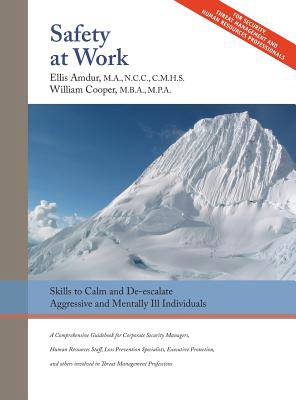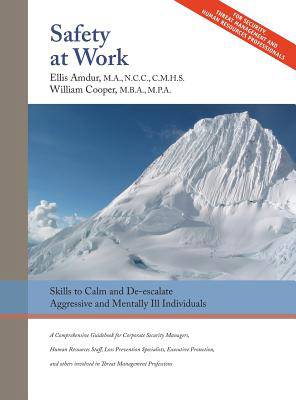
- Retrait gratuit dans votre magasin Club
- 7.000.000 titres dans notre catalogue
- Payer en toute sécurité
- Toujours un magasin près de chez vous
- Retrait gratuit dans votre magasin Club
- 7.000.000 titres dans notre catalogue
- Payer en toute sécurité
- Toujours un magasin près de chez vous
Safety At Work
Skills to Calm and De-escalate Aggressive & Mentally Ill Individuals: For All Involved in Threat Assessment & Threat Management
Ellis Amdur, William CooperDescription
Individuals suffering from psychiatric or substance use disorders sometimes display any one of a number of frightening behaviors: verbal outbursts, physical threats and even violence. Not only Corporate Security, Human Resources, Executive Protection, and Loss Prevention Professionals, but anyone who works may be forced to deal with such individuals. In this comprehensive guidebook, Ellis Amdur and William Cooper offer everyone a comprehensive set of strategies to keep themselves, those they may be responsible for protecting, as well as the general public safe while functioning at the highest level of professionalism. The first sections of this book focus on tactical concerns: threat assessment, tactical planning and the development of a safety mindset. In the second major section of the book, the authors focus on us: what we can do to achieve a state of integrity and powerful calm. Rather than abstract pronouncements, they offer specific strategies, including a method of breathing for the purpose of maintaining one's own center in crisis situations. In the heart of the book, they discuss specific behaviors ranging from confusion and obsessive concerns to psychosis, mania and acute disorganization. In two very important chapters, they discuss interactions with opportunistic and manipulative individuals (at worst, those referred to as psychopaths), people who present a danger to the psychological and physical well-being of anyone with whom they come in contact. They then move on a discussion of aggression, and how to de-escalate aggressive and chaotic individuals once a crisis begins. Amdur and Cooper elucidate the various motivations that drive aggression and further delineate the different types of aggression that result. De-escalation tactics are specific -- one learns how to immediately recognize what mode of aggression the person is displaying, and then, one can quickly and effectively implement the de-escalation tactics that are best suited to deal with the aggression one is facing. Final sections address staff members who function in specialized roles, including recommendations for training of support personnel and new hires.
Spécifications
Parties prenantes
- Auteur(s) :
- Editeur:
Contenu
- Nombre de pages :
- 282
- Langue:
- Anglais
Caractéristiques
- EAN:
- 9781950678037
- Date de parution :
- 03-05-19
- Format:
- Livre relié
- Format numérique:
- Genaaid
- Dimensions :
- 216 mm x 279 mm
- Poids :
- 943 g







